Pete Carter, A Film Historian in Mid-City
- Details
- Category: Featured Resident
- Published on Tuesday, 30 April 2013 16:34
- Written by Deborah Charles
More than 40 years ago, Pete Carter settled into the Mid City neighborhood having migrated here from Trenton, New Jersey.
Pete is known for his astonishing collection of African American films covering the period of 1902 to1951 which marked the end of the Oscar Micheaux era – the African American author, film director and independent producer of a number of popular silent films. Among Pete’s most cherished films are the 1902 version of “Cabin in the Sky” and a rare silent film “Hearts in Dixie” which was made in Hollywood. He owns 72 half hour episodes of “Amos and Andy” as well as films of Black casts made all over the world from Africa to South America.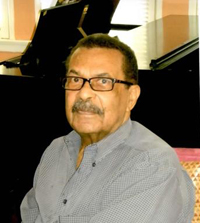 His penchant for collecting began when he was 5 years old after receiving a copy of a Billy Eckstine record called ”Jelly Jelly” from his sister. This was not considered an unusual gift from a family of jazz and film buffs. In 1908 his father opened a restaurant and hired a bus boy named Paul Robeson, who would pat Pete on the head and called him by the nickname his father had given him – “Petey Dink”. the name of a popular comic strip character. By the time Pete was in high school he learned who Paul Robeson had become when Paul would stop by the restaurant at least once a year. This new knowledge created curiosity and interest in movies with Black casts even though Paul Robeson’s movies were made in England. From that point on, Pete started going to see movies with Black casts.
His penchant for collecting began when he was 5 years old after receiving a copy of a Billy Eckstine record called ”Jelly Jelly” from his sister. This was not considered an unusual gift from a family of jazz and film buffs. In 1908 his father opened a restaurant and hired a bus boy named Paul Robeson, who would pat Pete on the head and called him by the nickname his father had given him – “Petey Dink”. the name of a popular comic strip character. By the time Pete was in high school he learned who Paul Robeson had become when Paul would stop by the restaurant at least once a year. This new knowledge created curiosity and interest in movies with Black casts even though Paul Robeson’s movies were made in England. From that point on, Pete started going to see movies with Black casts.
In college Pete studied to become an historian and collecting allowed him to become a part of history. He knew he could not afford to acquire 70mm print films so when VHS and BETA came out he started looking for Black films in those formats and soon became obsessed. Like most scholarly collectors he was inspired by the need to document art, history and culture. He now owns films in every format; 8mm, video tapes, BETA, blue-ray, etc.
In 2001 Pete suffered a stroke that affected his speech and mobility. One night, while lying in bed, he started thinking about what he could do to take his mind off of his health issues. The thought came to him to find a way to share his film collection. The next morning he discussed the idea with Janice, his lovely wife of 37 years. Janice who is a member of the Wilfandel Club of the famed Wilfandel House, the historic mansion on West Adams, said she would talk it over with the other members and perhaps he could use the venue.
Thus began the screening series of these rare Black films, shown the last Friday of every month at 12 o’clock noon. This event has become one of the community outreach programs for the Wilfandel House and a way for Pete to share this rich film history. “It gave me incentive to push myself.”
But Pete’s historical interest doesn’t stop there. He now holds the esteemed position of President of the Duke Ellington Society here in Los Angeles, which is dedicated to the preservation of his music. The Duke Ellington Society has branches in the U.S., Canada, Sweden and England to name a few. The group meets every 3rd Sunday at the Barbara Morrison Performing Arts Center located at 4305 Degnan Blvd. in Leimert Park.
Pete is hopeful the new venue will help draw more people and especially younger people to become members. He speaks very proudly of his teenage granddaughters who not only assist him with the screenings of the historical vintage movies when they’re not busy with school, but who also delight in the music of Duke Ellington preferring jazz over rap and hip-hop.
Pete’s goal for his tenure as President is to keep Duke Ellington’s music fresh, to share and educate people about the historical nature of the man and the music.His knowledge of Black film and the music of Duke Ellington have made him recognized as the resident expert of this era and he is sought out as a resource on production projects that require authentic settings and music for the early period of Black films.
Zen Master Joshu Sasaki Roshi
- Details
- Category: Featured Resident
- Published on Thursday, 23 August 2012 23:23
- Written by Dianne Lawrence
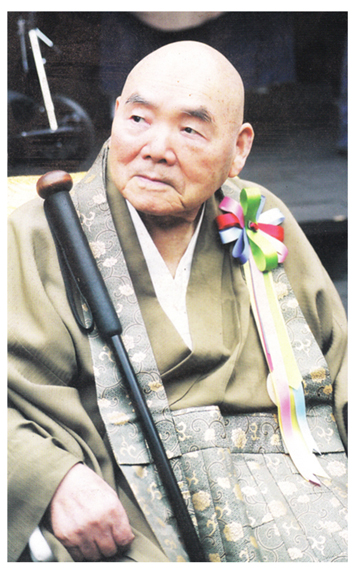
Celebrates 105th Birthday & 50 Years of Teaching in America
On July 21st, The Rinzai-Ji Zen Temple celebrated the 105th birthday of the temple’s spiritual founder and leader, Zen Master Joshu Sasaki.
They commemorated the 50th anniversary of his arrival in the USA. Festivities began at the Rinzai-Ji Temple at 2505 Cimarron Street (and Adams) and continued onto the opulent grounds of the UCLA Clark Library.
Joshu Sasaki Roshi was born near Sendai Japan in April 1907. At 14 years he began his life as a Zen student, at 21 he was ordained an Osho (priest) and at 40 became a Roshi (title given to a zen master). On July 21, 1962, at age 55 he arrived in the United States with an English translation book and a vision of establishing a Rinzai zen practice in America. By 1968 and with 200 students he celebrated the opening of the Temple on the Cimarron property, establishing the first of several Rinzai Zen Centers in America. Between then and the present the temple has hosted many zen retreats and offers meditation instruction. Even at his age of 105 Roshi Sasaki remains the abbott and inspirational leader of the Rinzai-Ji Zen Center.
Guests at the event numbered approximately 240 and included a delegation of zen monks and lay people from Japan as well as a large number of zen monks and priests, ordained by Roshi Sasaki.
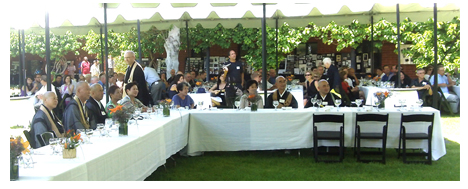
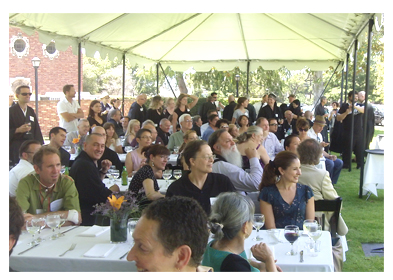 Also several of the guests were lay people from around the world and the local community.
Also several of the guests were lay people from around the world and the local community.
To everyone’s delight and pleasure Roshi Sasaki gave a special dharma talk at the morning ceremony and pleased his students by promising to live to 120. Roshi thanked everyone for coming to honor his efforts to bring his style of Zen teaching to the United States.
James Carey, Local Theater Director, Gets Prestigious Opportunity in Zimbabwe
- Details
- Category: Featured Resident
- Published on Monday, 18 June 2012 21:13
- Written by Renee Montgomery
West Adams resident James Carey is taking his show on the road.

Actor-director Carey is founder of the nearby Attic Theatre & Film Center.
Located on Washington Blvd at Hauser, the Attic is a year-round, full-service theatre with a complete season of plays. With a mission to present West Coast premiers of original works and innovative productions of classical plays, the playhouse also serves as an important venue for local artists-- featuring everything from dramatic readings to rap music. Last year Carey presented the hit musical “Come Together: A Beatles Cabaret,” which will now travel to Rome’s Abarico Theatre where Carey will direct it with Italian singers in August. Last year the theatre initiated a regular program of charming children’s plays, and this year they will be offering a weekly children’s acting workshop for ages 6 - 10 starting June 1st. The Attic’s 2012 season includes “Much Ado About Nothing,” “Musical Valentine,” and their national recognized One Act Festival now entering it 21st year.
Raised in Georgia and Tennessee, Carey has lived in the 10th Council district since 2001 and currently resides near Arlington and 25th streets. He has had extensive training that includes a BFA in theatre, and two MFA’s – in Acting and Directing from UNC Chapel Hill and in Arts Management from CSULB. Along with his late wife Denise Ragan, Carey founded the Attic Theatre in 1987 which enjoyed the distinction of being the oldest producing organization on the Hollywood Theatre Row until 2003.
But Carey’s scope is international and he is currently preparing to bring his prodigious talents to Zimbabwe‘s annual Speech and Drama Festival of the National Institute of Allied Arts. Encouraged to apply for inclusion in the festival by a local Zimbabwean ex-patriot, Carey is the first American to be accepted in the event’s 97-year history. Over 17 days the festival provides 150 workshops in drama, poetry, storytelling, choral speaking, improv, monologues, sketches and plays for 5,000-6,000 students from Zimbabwean elementary, middle and high schools. During the course of the festival, students are trained, then perform in 20 different categories, and are judged on whether they may advance to higher levels of the competitive event. “There’s nothing like it in the US,” Carey explains. Carey will serve as an instructor and adjudicator, giving approximately 1,500 students critical feedback and coaching. “The festival’s purpose is to encourage kids to read, get involved, do public speaking, and build themselves as individuals,” Carey informed TNN. Native Zimbabwean teachers will also pick up important training at the event as most of the country’s experienced teachers have been driven out by the former Mugabe government. UNICEF has declared the country’s educational system a “national disaster.”
See http://www.indiegogo.com/Teaching-in-Africa-Directing-in-Roma for more info. Visit Attic’s website for its call for writers to participate in its annual One-Act Festival at www.attictheatre.org. The Attic Theatre is located at 5429 W. Washington Blvd., L.A., 323.525.0661. UPDATE Oct 2018 The theatre is currently closed.
Maxie Floyd and All That Jazz
- Details
- Category: Featured Resident
- Published on Monday, 02 July 2012 21:29
- Written by Deborah Charles
Maxie Floyd has lived and owned property in Mid City for over forty years. A jazz enthusiast and historian, Max is known for his fine art photography of iconic photos of great jazz musicians and for his knowledge of the history of jazz in our community.
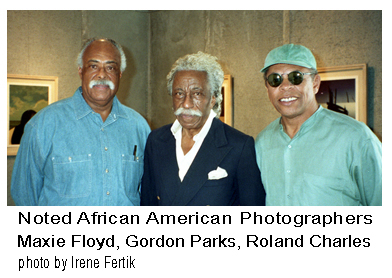
When jazz greats such as Duke Ellington and Charlie Parker came to perform in Hollywood they were not invited to stay in the hotels located there. The musicians would have to come to the black community to find a decent hotel such as the Dunbar Hotel on Central Avenue and 42nd.
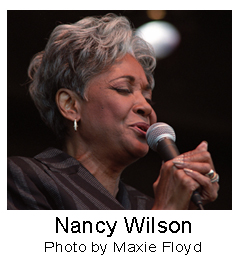 As the racial divide became more relaxed, African American families began moving to Inglewood, Baldwin Hills and Mid-City which was considered the Westside. Hotels and jazz clubs began to emerge, such as the Watkins Hotel located on Manhattan Pl and Adams Blvd and the Clark Hotel located on Washington Blvd and Central Ave, were considered top-notch. With the exception of the Dunbar Hotel, which has become an historical landmark and museum, the Clark and Watkins Hotel no longer exists.
As the racial divide became more relaxed, African American families began moving to Inglewood, Baldwin Hills and Mid-City which was considered the Westside. Hotels and jazz clubs began to emerge, such as the Watkins Hotel located on Manhattan Pl and Adams Blvd and the Clark Hotel located on Washington Blvd and Central Ave, were considered top-notch. With the exception of the Dunbar Hotel, which has become an historical landmark and museum, the Clark and Watkins Hotel no longer exists.
Inside the Watkins Hotel was a well-known barbershop that Nat King Cole patronized. When Maxie would pick up his sister who worked as a secretary to theowner of the hotel he recalled seeing Nat in the barber shop several times. There was also a jazz lounge inside the hotel called the Rubiot Room that had a separate entrance on Manhattan Pl. Nate King Cole lived on W. 29th St, the exact same street as Maxie’s grandmother, until he moved to June St in Hancock Park, which created a huge controversy in that community.
Cooking With Gabby
- Details
- Category: Featured Resident
- Published on Thursday, 05 April 2012 00:04
- Written by Herbert A. Sample
Parents trying to cook at home for finicky kids who are constantly exposed to Ronald McDonald, the Colonel and every sugary concoction imaginable are in for a struggle to start with. But cooking healthy?
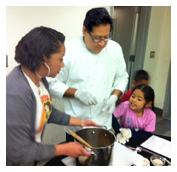 As difficult as that may be, Los Angeles restaurateur Steven Vasquez and his family are on a mission to ease parents’ pain – by coaxing kids themselves to realize the delight in eating healthy, delicious meals that contain fresh ingredients.
As difficult as that may be, Los Angeles restaurateur Steven Vasquez and his family are on a mission to ease parents’ pain – by coaxing kids themselves to realize the delight in eating healthy, delicious meals that contain fresh ingredients.
With little fanfare, the Vasquez family for the last five years have been visiting Los Angeles-area recreation centers and other locations, holding exercise and cooking sessions for kids under the rubric “Cooking With Gabby” – Gabby being Vasquez’ daughter Gabriella.
The gatherings, usually held in Latino and African-American neighborhoods, can be small, sometimes just a couple handfuls of children between the ages of 9 and 12. And they can occasionally be unruly, given kids’ penchant to fidget and dismiss anything that doesn’t come with buttons and a screen.
More Articles...
Yesterday9
Week14
Month33
All988075
Currently are 74 guests and no members online
Kubik-Rubik Joomla! Extensions


